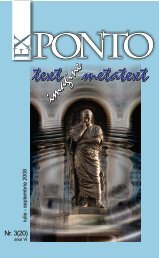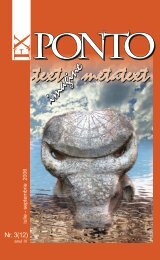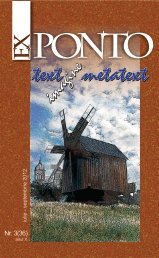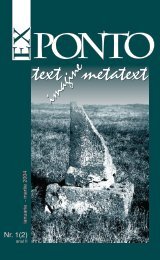Nr. 3 (32) anul IX / iulie-septembrie 2011 - ROMDIDAC
Nr. 3 (32) anul IX / iulie-septembrie 2011 - ROMDIDAC
Nr. 3 (32) anul IX / iulie-septembrie 2011 - ROMDIDAC
You also want an ePaper? Increase the reach of your titles
YUMPU automatically turns print PDFs into web optimized ePapers that Google loves.
Ex Ponto nr. 3, <strong>2011</strong><br />
Rose believes he is in love with her. She is close to Agnes. We learn through<br />
Michael that Rose dies in a mental institution for the destitute in Southwark in<br />
the 1950s. Agnes and Rose also help Maggie (38 years old) to keep the house.<br />
Maggie is always telling jokes, defusing the tension; she challenges Kate’s<br />
authority but also acts as her confidant. She may have had dreams of her<br />
own, revealed when she hears of her friend’s children. Maggie and Christina<br />
(26 years old) have no income at all. Christina is Michael’s mother; he state of<br />
mind fluctuates between depression when Gerry leaves and optimism when<br />
he comes back as she hopes each time that it will be permanent.<br />
Jack (53 years old), the women’s brother, has recently returned from Africa<br />
where he was a missionary priest, in Uganda in village called Ryanga. He is<br />
a former Catholic chaplain to the British Army in East Africa during WWI. He<br />
worked in a leper colony there and he is respected in Donegal for his missionary<br />
work. He is suffering from malaria and has trouble remembering things. He<br />
confuses his sisters’ names and mistakes them for his house boy Okawa. He<br />
seems to have forgotten Catholicism and turned pagan, admiring the pagan<br />
beliefs of the African natives. He worries Kate, who is concerned with the<br />
reputation of the family. Jack also admires Christina for having a child. Jack<br />
recovers from his malaria and confusion eventually, but dies later of a heart<br />
attack. Father Jack’s story is illustrative of the motif of tragic homecoming,<br />
which is to be encountered in other plays by Friel.<br />
The other man in the Mundy sisters’ lives is Gerry (33 years old), a nice<br />
but unreliable Welsh, who is a travelling salesman. He visits the sisters from<br />
time to time. There is a possibility that Gerry is serious this time about his<br />
marriage proposal to Christina, but he postpones it until after his return from<br />
Spain, where he wants to fight in the Spanish Civil War, ironically against<br />
Franco, who was supported by Catholics. Gerry is portrayed as a good dancer,<br />
but in a negative light as he left Christina and had an illegitimate child. His job<br />
as a travelling salesman gives him the freedom that the Mundy sisters lack.<br />
Through Michael, we find out that he has been left with a limp after falling<br />
off a motorbike in Barcelona. Also, he has another family in Wales and his<br />
proposals of marriage to Christina are false. After Gerry’s death, in the 1950s,<br />
Michael is contacted by a half brother in South Wales, who reveals that Gerry<br />
had a wife and several sons at the time of the action.<br />
The financial insecurity of the sisters is a constant theme. They never got<br />
married though they seem to have had suitors they remember; yet, no reliable<br />
men seem to surround them. The situation gets worse with the opening of<br />
the knitwear factory, which has killed the hand knitted glove industry and<br />
which has been Agnes and Rose’s job. Moreover, the village priest tells Kate<br />
that there are not enough pupils for her to continue teaching in autumn. Kate<br />
suspects it is because of her brother’s behavior, as he will never be able to<br />
hold Mass again.<br />
The background of the play is the Republic’s 1937 Constitution, which<br />
included, besides the principles of conservative Catholicism, a sort of romantic<br />
vision of Irish woman, “wife and mother”: her life (not her work) within the<br />
home “gives to the State a support without which the common good cannot be<br />
achieved”. According to Lojek, this portrayal embodies “the ideal of the ‘sainted’<br />
Irish mother to become a hallmark of national patriarchal assumptions” (78).<br />
There is a feeling throughout the play that these women’s lives are going to<br />
be torn apart that summer. Because of a feeling of failure, Friel’s characters<br />
may seek refuge in words or work, like Agnes or Kate, silence, like Rose or<br />
174
















